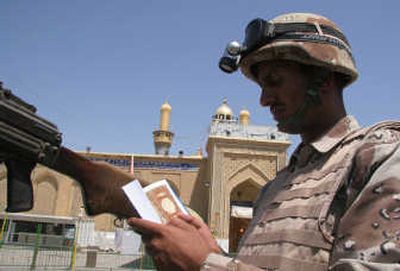Study blasts Iraq police force

WASHINGTON – Iraq’s security forces will be unable to take control of the country in the next 18 months, and Baghdad’s national police force is so rife with corruption it should be scrapped entirely, according to a new independent assessment.
The study, led by retired Marine Corps Gen. James Jones, is a sweeping and detailed look at Iraq’s security forces that will factor heavily into Congress’ upcoming debate on the war. Republicans see success by the Iraqi forces as critical to bringing U.S. troops home, while an increasing number of Democrats say the U.S. should stop training and equipping such units altogether.
The 20-member panel of mostly retired senior military and police officers concludes that Iraq’s military, in particular its army, shows the most promise of becoming a viable, independent security force with time. But the group predicts an adequate logistics system to support these ground forces is at least another two years away.
The report also offers a scathing assessment of Iraq’s Interior Ministry and recommends scrapping Iraq’s national police force, which it describes as dysfunctional and infiltrated by militias.
Overall, Iraqi security forces “have the potential to help reduce sectarian violence, but ultimately the ISF will reflect the society from which they are drawn,” according to the report, a copy of which was obtained by the Associated Press. “Political reconciliation is the key to ending sectarian violence in Iraq.”
The United States has spent $19.2 billion on developing Iraq’s forces, and plans to spend $5.5 billion more next year. According to Jones’ study, the Iraqi military comprises more than 152,000 service members operating under the Defense Ministry, while the Interior Ministry oversees some 194,000 civilian security personnel, including police and border control.
The review is one of several studies that Congress commissioned in May, when it agreed to fund the war for several more months but demanded that the Bush administration and outside groups assess U.S. progress in the four-year war.
Jones, a former commander of U.S. troops in Europe and former Marine Corps commandant, is scheduled to testify before Congress today. Defense Secretary Robert Gates and other officials have already been briefed on the study, officials said last week.
A senior Pentagon official said Wednesday that the military does not believe the Iraqi national police should be disbanded but acknowledges that getting the Iraqi army up to speed will take a while.
Several lawmakers – many of whom face tough elections next year – said they would be unswayed by the Jones report and other independent assessments. Congress would fare better by finding a bipartisan solution that would bring troops home, they say.
“No matter what these reports suggest or what Congress infers from them, it is clear that it is time to develop a post-surge strategy,” wrote 13 lawmakers, including three Republicans, on Wednesday to House Speaker Nancy Pelosi, D-Calif., and Majority Leader Steny Hoyer, D-Md.
But other lawmakers were expected to take keen interest in Jones’ report, which is a rare, detailed look at individual pieces of Iraq’s emerging security force. The report was requested by Sen. John Warner, R-Va., the No. 2 Republican on the Senate Armed Services Committee, who said he wanted an assessment independent of the Pentagon’s findings.
According to the study, the panel agreed with U.S. and Iraqi officials that the Iraqi army is capable of taking over an increasing amount of day-to-day combat responsibilities but that the military and police force would still be unable to take control and operate independently in such a short time frame.
“They are gaining size and strength, and will increasingly be capable of assuming greater responsibility for Iraq’s security,” the report states, adding that special forces in particular are “highly capable and extremely effective.”
The report is much more pessimistic about Baghdad’s police units. It describes these units as fragile, ill-equipped and infiltrated by militia forces. And they are led by the Interior Ministry, which is “a ministry in name only” that is “widely regarded as being dysfunctional and sectarian, and suffers from ineffective leadership.”
Accordingly, the study recommends disbanding the national police and starting over.